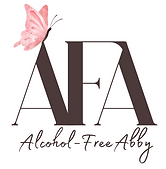How to Build Confidence by Eliminating Alcohol from Your Life
- Abby Calabrese
- Mar 31
- 4 min read

When you cut alcohol out of your life, you unlock a level of confidence you never knew existed. You begin to realize that you don’t need to be anything other than yourself. There’s nothing wrong with you. You were never lacking. Alcohol just made you believe that you were.
Many of us started drinking at a young age, often in our teens or early twenties, when we were still trying to figure out who we were. At that time, alcohol seemed like a magic potion—an elixir that made us feel more social, more fun, more accepted. But in reality, drinking too early can stunt the growth of something far more valuable: self-acceptance.
Instead of strengthening the muscle of self-discovery and learning to truly love who we are, we learned to rely on alcohol as a shortcut to confidence, fun, and belonging.
Unwiring the False Beliefs About Alcohol
Somewhere along the way, we equated alcohol with fitting in. We associated drinking with being fun, outgoing, and part of the crowd. But that belief isn’t reality—it’s just how we wired our brains. The good news? You can rewire it.
Just like training a muscle or practicing a sport, shifting your mindset about alcohol takes time and effort. It’s a skill to be learned. At first, it might feel uncomfortable—like learning to walk again—but with practice, it becomes second nature. You start to see the truth: that you don’t need alcohol to enjoy yourself. You don’t need it to be interesting, to be liked, or to have a good time. You just need to be you.
And once that realization clicks, it’s the most freeing feeling in the world.
The Expansiveness of Sobriety
Living alcohol-free opens up a whole new world. But that new world doesn’t always align with the one you lived in before. When you remove alcohol, you gain clarity—not just about yourself but about your surroundings. You start to see things for what they really are.
Maybe you realize that certain social situations don’t actually bring you joy. Maybe some of the friendships you maintained were built solely around drinking. Maybe you find that the things you used to do just don’t appeal to you anymore. That realization can be unsettling at first. Change can be scary, but what’s scarier is staying stuck. Staying in a place where you believe you need an addictive poison to have fun or fit in.
Sobriety may encourage you to make new friends, try new things, and explore different interests. That growth might feel uncomfortable at first, but ultimately, it leads to something so much greater—an authentic, fulfilling life where you show up fully as yourself, no numbing, no pretending, no regrets.
Over a Year In: No Desire to Drink
After 506 days of sobriety, I can confidently say I have zero desire to drink. And I mean that. It’s not about resisting cravings or wishing I could have a cocktail but choosing not to. It’s about genuinely not wanting it. I know what it feels like to crave alcohol—I felt it during pregnancy when I had to abstain but still wished I could have a drink. I felt it early on in sobriety. But this is different. I’ve moved past it.
I am just as happy, if not happier, with a nonalcoholic beverage in hand, fully present in the moment. I love knowing I will wake up feeling amazing, with no shame spiral, no anxiety, no regret. Instead of being trapped in a toxic cycle—drinking, feeling ashamed, recovering, and doing it all over again—I continue to flourish.
The Cycle vs. The Upward Trajectory
Picture two different paths. One is a cycle:
Drink to have fun.
Wake up feeling terrible.
Hate yourself.
Recover.
Do it again.
The other is an upward trajectory:
Choose sobriety.
Wake up feeling amazing.
Gain clarity and confidence.
Continue to grow and evolve.
Flourish.
Where are you looking to go?
Three Tips for Early Sobriety
If you’re in early sobriety and feeling discouraged, wondering if life will ever be fun again without alcohol, here are three tips to help you through:
Give Yourself Time – In the beginning, it’s going to feel strange. Your brain has been wired for years to associate alcohol with fun and connection. But the more time you give yourself, the more you’ll realize that life is actually better without it. Trust the process.
Find New Ways to Have Fun – Explore alcohol-free activities that excite you. Try new hobbies, join sober communities, or start a fitness journey. Fun isn’t exclusive to drinking. In fact, real fun—authentic, lasting fun—happens when you’re fully present, not numbed out.
Remember Your ‘Why’ – When doubt creeps in, remind yourself why you started. Think about how you feel waking up clear-headed, the confidence you’ve gained, and the freedom you now have. The longer you stay alcohol-free, the more undeniable the benefits become.
Embracing the Confidence of Sobriety
The biggest gift of sobriety isn’t just better health, better sleep, or better mornings. It’s the confidence of knowing you are enough. Without alcohol. Without pretense. Just as you are.
The world tries to convince us that we need alcohol to fit in, to have fun, to be interesting.
But the truth? The real magic happens when you let go of that lie and step fully into yourself.
You are fun. You are confident. You are whole.
No alcohol required.

Comments